The Samsung 950 Pro PCIe SSD Review (256GB and 512GB)
by Billy Tallis on October 22, 2015 10:55 AM ESTSequential Write Performance
The sequential write test isn't limited to a small span of the disk, as that usually doesn't make a difference for this performance metric. As always, our averages are of the lower queue depths, but scaling to higher queue depths is also investigated. Bulk file copies and recording uncompressed video are the kind of uses that depend on sequential write performance.
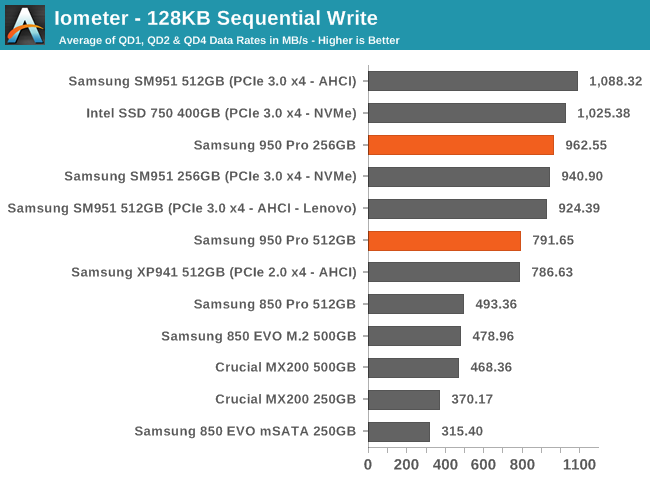
Even at low queue depths, most SSDs can spread a sequential write workload across multiple channels to achieve very high throughput. All of the PCIe drives perform well above the SATA limit but nowhere near the capacity of the PCIe links. The 512GB 950 Pro seems to again be encountering thermal throttling, and more severely than the SM951s we tested.
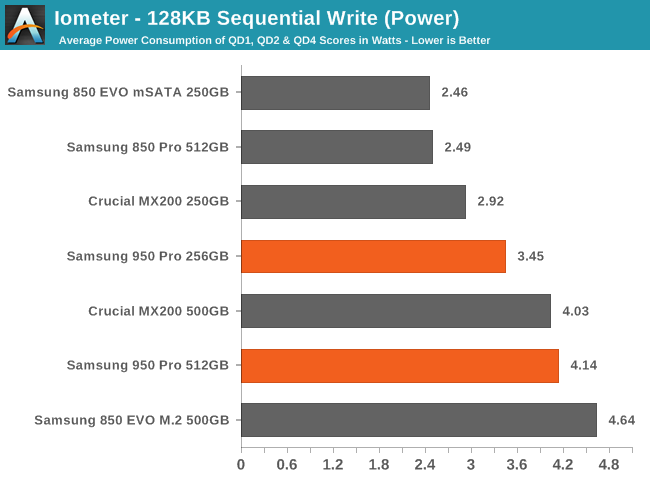
The average power consumption for writes is still on the high side by SATA standards, but is quite reasonable in light of the performance achieved.
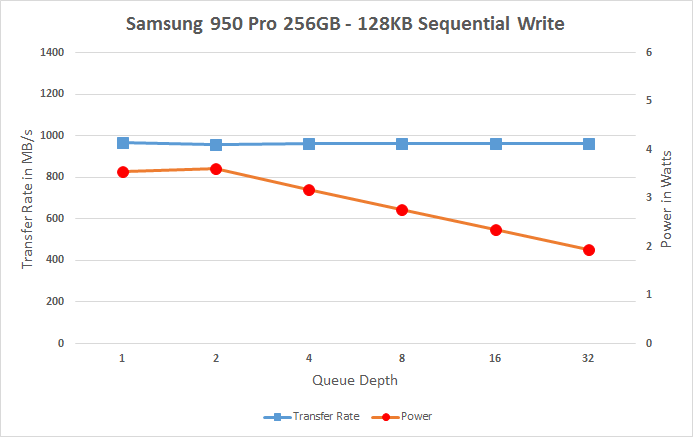 |
|||||||||
Performance across the sequential write test is mostly constant, but power isn't. The declines in power consumption in spite of increased queue depth are again most likely an artifact of whatever background processing is going on in the drive. On SATA drives, it's usually obvious from looking at the power meter when a drive has completed background processing and is truly idle and ready to run the next test, but with the lack of working power management for PCIe drives on our testbed I'm not so sure here. Overall it's probably a good sign that the drives were able to maintain high performance in spite of whatever else was going on, but given more cooling the 512GB can probably do much better.
Sequential Read Performance
Just like the random read test, sequential reads are tested across the span of a full drive and a representative sample of queue depths. Most operations involving large files (typically images and videos) fall under this test's purveiw, but streaming or playing even the highest resolution videos won't be a challenge for any of these drives. Copying files to another SSD or loading a new level in a video game would be more likely to show noticeable difference from better performance here.
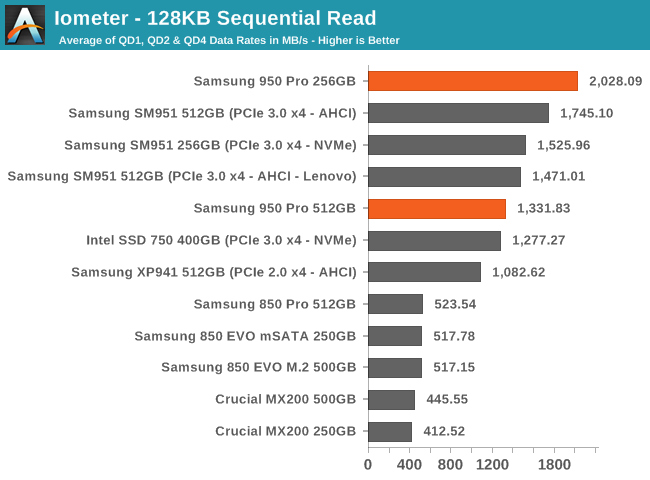
The sequential read performance is probably the best showcase of what the PCIe 3.0 x4 interface can do. The 256GB 950 Pro attains over half of the link speed, but the 512GB is again bogged down by something—relatively speaking, since it's still more than twice the speed of SATA and faster than even the Intel SSD 750. It's possible that the 950 Pro isn't faithfully implementing the secure form of the NVMe format command and some lingering fragmentation is preventing the 512GB drive from performing as specified. Read operations require less power to be supplied to the flash chip than for writes, but if the thermal throttling is all in the controller it could be showing up here as well.
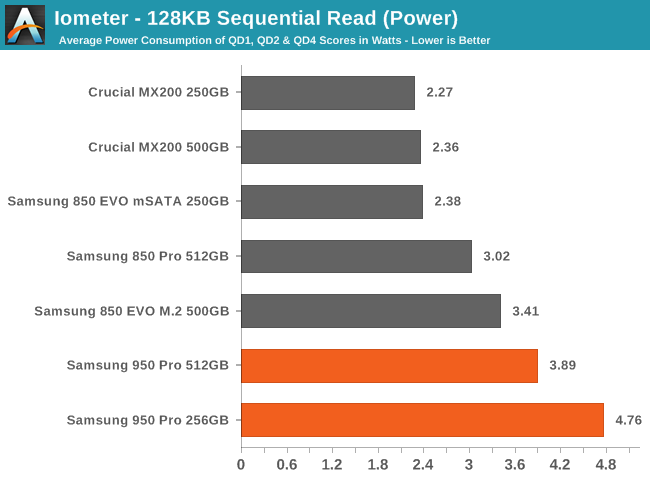
Relative to each other, the 950 Pro's power consumption is in line with the performance they're demonstrating, and proportionally much better than the SATA drives.
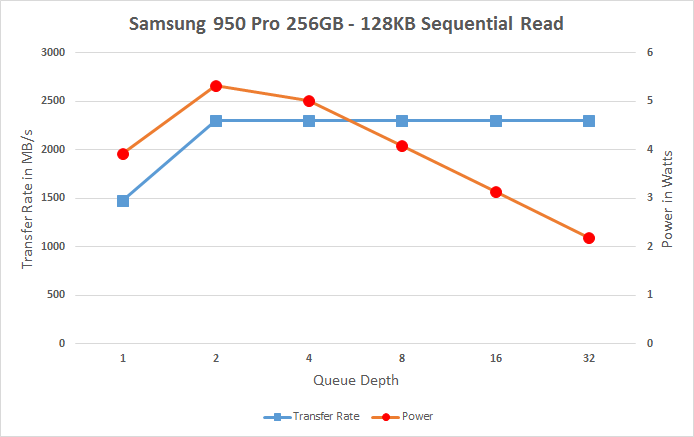 |
|||||||||
At queue depth 1, both of the 950 drives are performing similarly. When moving to higher queue depths the 256GB immediately hits 104% of its rated speed, but the 512GB doesn't improve any. (It's worth noting the differing scale for Transfer Rate in the graphs above.) The puzzling decline in power consumption at higher queue depths shows up again on the 256GB and definitely warrants deeper investigation.










142 Comments
View All Comments
herbc - Friday, October 23, 2015 - link
How fast do you really need to be happy with using a computer is my question , my computer is faster now than i actually need it to be and all it has is a current SSD .Woff - Friday, October 23, 2015 - link
I have a system with Asus X99 DeLuxe motherboard and a I7-5960X cpu. I use a Samsung 850 EVO 500GB SSD connected to one of the SATA ports, but I want to upgrade this device to a M.2 Samsung 950 Pro. The motherboard offers two ways to connect a M.2 but I don't know witch is the best alternative. The X99 has a on-board M.2 (socket3) but is also delivered with a expansion card, a 'HYPER M.2 x4' card. Anyone who can help me with the best (fastest) solution to my problem?Redstorm - Friday, October 23, 2015 - link
You should be OK to use the Onboard M.2 slot as the manual says "32Gb transfer for the onboard M.2" page 'x' so 4 x PCIe 3.0cjelliott - Tuesday, November 17, 2015 - link
How did you get on with this 950 Pro SSD on the X99 Deluxe? Can you boot from it? I am tempted to buy this SSD but have seen a lot of forums where people are having trouble. I want to install and boot Win 10 Pro from it.l_d_allan - Saturday, October 24, 2015 - link
Hmmmm ... the Samsung Galaxy review was at the top for 5 days, then one day for an ASUS mother board, and only one day for the Surface 4, and now several days for the Samsung PCie SSD.Seems unbalanced. Or just "the luck of the draw"?
Kristian Vättö - Sunday, October 25, 2015 - link
Usually content is only released on weekdays, so reviews that go up later in the week (e.g. on Thursday) may get several days of page time. Oftentimes the content release is dictated by an embargo lift, so the time of publishing isn't on AnandTech's hands.I can assure you that this is just a coincidence - there's no rule or contract that a certain company must get X number of days at the top. Frankly, it wasn't even something we thought about during my time at AnandTech as content always went up when it was ready and free for publishing.
Craig234 - Saturday, October 24, 2015 - link
"The Intel SSD 750 clearly needs to come down in price to be completely sidelined by the 950 Pro. "I think you mean to AVOID being completely...
TheBeagle - Saturday, October 24, 2015 - link
I case anybody is interested, Amazon.com has this lovely items for sale (pre-order) right now. The Amazon web site says the product will be released for sale on Thursday, October 29th. Hurry up before they're all gone - LOL! BeagleFXi - Saturday, October 24, 2015 - link
I know it's not a lot of space but some degree of power loss protection would have been proper for a "pro" device in this price category.Kristian Vättö - Sunday, October 25, 2015 - link
The 950 PRO, just like all Samsung client SSDs, do journaling to protect the FTL against sudden power losses. Protection for cached user data is not really needed since modern file systems have been designed to withstand minor data losses (HDDs also use DRAM to cache writes, so SSDs are no different in that sense).